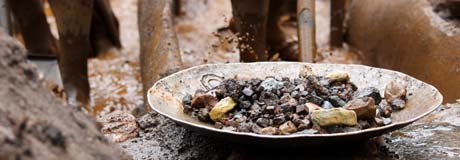
Great Lakes Region: working together to curb the illegal exploitation of, and trade in, natural resources
22.06.2015 – With support from Germany and the EU, the International Conference on the Great Lakes Region (ICGLR) in Central Africa is tackling illegal resource exploitation and trade.
Gold, coltan,wolframite: great resource wealth lies underground in some Central African countries. Yet the benefits are rarely felt by local communities, as these resources, for which there is substantial international demand, are often extracted and traded illegally, depriving the countries concerned of tax revenue and economic development opportunities. Instead, the profits often flow to criminal organisations and armed groups, which use them to fund brutal conflicts. As a consequence, the entire region suffers.
Twelve countries around Africa’s Great Lakes, including Rwanda, Kenya, the Republic of the Congo and the Democratic Republic of the Congo, have therefore established the International Conference on the Great Lakes Region (ICGLR), a regional organisation which aims to promote peace, security, stability and development. A key goal is to curb the illegal trade in conflict resources.
The ICGLR Secretariat organises a regular exchange of information at the highest political level, mediates between national interests, and implements transboundary projects which aim, for example, to curb arms trafficking. The initiative receives financial assistance from the European Union (EU) and Germany. Practical support is provided by the Deutsche Gesellschaft für Internationale Zusammenarbeit (GIZ) GmbH and the German Federal Institute for Geosciences and Natural Resources (BGR) on behalf of the German Federal Ministry for Economic Cooperation and Development (BMZ).
Through GIZ’s contribution, in the form of advisory services and staff training, the International Conference on the Great Lakes Region (ICGLR) has gained in influence and now enjoys international recognition as a coordinating body.
A further task for the ICGLR is to harmonise national legislation whose purpose is to curb the illegal trade in natural resources. Uganda, Burundi, Rwanda and the Democratic Republic of the Congo have already aligned their laws with the regional agreements. In addition, efficient monitoring systems are required in order to detect and halt illegal transactions. After initial positive experience with anonymous reporting, this whistleblower system is now undergoing practical trials in eastern Congo.
The centrepiece of the resource initiative is a regional certification system designed to enhance transparency in the resource trade. Since late 2014, certificates for resource exports have been issued in Rwanda and the Democratic Republic of the Congo. The benefit is that holders of the certificates can thus demonstrate to buyers that the resources were extracted and are being traded legally in compliance with international standards. Foreign buyers, such as the electronics industry, are now demanding this type of evidence from suppliers.
In addition, the German Federal Institute for Geosciences and Natural Resources (BGR) is currently developing a proof of origin scheme for natural resources. Based on its system of analysis, it is possible to demonstrate beyond doubt which particular mine certain minerals come from, thus excluding any possibility of fraud.